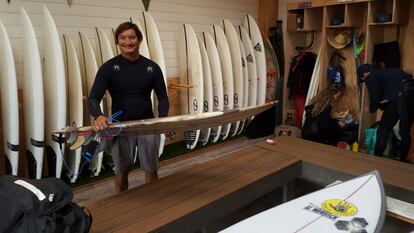Mikala Jones, Hawaii surfer known for filming inside waves, dies in surfing accident
Jones had gone out into the ocean Sunday morning during a trip to the Mentawai Islands off the western coast of Sumatra when his surfboard fin cut his femoral artery

Mikala Jones, a Hawaii surfer known for shooting awe-inspiring photos and videos from the inside of massive, curling waves, has died after a surfing accident in Indonesia. He was 44.
Jones had gone out into the ocean Sunday morning during a trip to the Mentawai Islands off the western coast of Sumatra when his surfboard fin cut his femoral artery, said his father, dentist Dr. John Jones. The femoral artery is a large blood vessel in the thigh that delivers blood to lower limbs.
“He was a humble artist. His pictures were incredible,” his father said in a phone interview from his Honolulu office on Monday.
Jones’ Instagram account shows stunning images of waves curling around him from above while he crouches on his board. In some shots, a sunset or sunrise is visible through the curved wave opening in front of him.
Surf photographer Woody Woodworth, who said Jones took the best overall surf photo he’d ever seen, said cuts from surfboard fins are common. Some surfers like to keep their fins sharp because they believe doing so will help them ride waves more precisely — but a fin can be like an axe or a cleaver when combined with a wave’s power, he said.
“All the fins that I see are certainly sharp enough with the force of a wave, and pointy enough with the force of the wave, that slicing into somebody’s leg would be very easy,” Woodworth said.
The elder Jones took photos for surfing magazines starting in the 1970s, but mostly shot from the beach or snapped pictures of other people in the water. Not his son.
“He was interested in taking pictures while he’s surfing of himself and the wave,” he said.
Born in Kailua, Hawaii, Jones started surfing at about seven or eight years old and began competing in the 12-and-under “menehune” age group a few years later. He won two national championships as an amateur.
Later, he took on sponsors and traveled to surf spots in Tahiti, Fiji, South Africa and the Galapagos Islands. Photographers would shoot images of him and other surfers on the waves which would appear in photo spreads in surf magazines. Manufacturers of surf clothing and gear featured them in their advertisements.
In the 1990s, Jones began to experiment with taking first-person images of himself on the the water. Jones attached a camera to fabric fastener on his board and then held the camera under his chin while paddling out to waves lying on his stomach. He’d grab the camera upon standing and hold it behind himself to take pictures.
He began to use a GoPro after the lightweight cameras were invented and was eventually sponsored by the company. He used software to stitch together images from multiple GoPro cameras for 360-degree views.
Woodworth singled out one photo in particular for praise, calling it “beyond spectacular.” The shot, which was featured on the cover of The Surfer’s Journal, shows Jones in a wave tube with his left arm outstretched. Jones faces the wall of the wave which reflects both the sunlight shining into the barrel and Jones himself.
“It’s 10 points on the surfing and 10 points on the photography technically and 10 points on the concept,” said Woodworth. “This is like, hands down, the Olympic-winner-of-all-time photograph.”
Jones was aware of the dangers that can accompany surfing, once having an out-of-body experience after nearly drowning.
“He was flying in the sky, and he looked down and his body was floating in the ocean,” his father said. “And then he heard his daughters calling to him ‘Daddy come home.’ And then he went back down into his body.”
He woke up on the reef, having been washed in by waves.
The elder Jones said he’s tried to get his four children to wear wetsuits, helmets and other protective gear while surfing. Surfers are often told to use sandpaper to dull the edges if their fin is too sharp, he said.
“But they’re stubborn, you know?” he said.
Jones is survived by his wife Emma Brereton and daughters Bella and Violet, who split their time between homes in Bali, Indonesia and Hawaii. In addition to his father, Jones is survived by an older sister and two younger brothers. His mother Violet Jones-Medusky died in 2011.
Sign up for our weekly newsletter to get more English-language news coverage from EL PAÍS USA Edition
Tu suscripción se está usando en otro dispositivo
¿Quieres añadir otro usuario a tu suscripción?
Si continúas leyendo en este dispositivo, no se podrá leer en el otro.
FlechaTu suscripción se está usando en otro dispositivo y solo puedes acceder a EL PAÍS desde un dispositivo a la vez.
Si quieres compartir tu cuenta, cambia tu suscripción a la modalidad Premium, así podrás añadir otro usuario. Cada uno accederá con su propia cuenta de email, lo que os permitirá personalizar vuestra experiencia en EL PAÍS.
¿Tienes una suscripción de empresa? Accede aquí para contratar más cuentas.
En el caso de no saber quién está usando tu cuenta, te recomendamos cambiar tu contraseña aquí.
Si decides continuar compartiendo tu cuenta, este mensaje se mostrará en tu dispositivo y en el de la otra persona que está usando tu cuenta de forma indefinida, afectando a tu experiencia de lectura. Puedes consultar aquí los términos y condiciones de la suscripción digital.








































